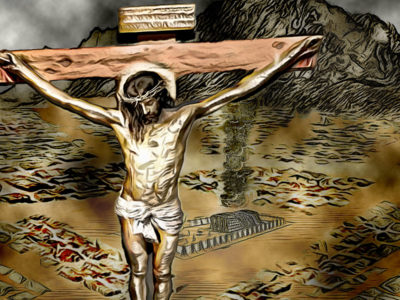JESUS SHOWS UP 700 years before his birth, in a dramatic prophecy from the Book of Isaiah: Isaiah 53.
At least that’s what most Christian scholars seem to say.
They say Jesus is the mysterious Servant of God who suffers and dies for the sins of others.
Jewish scholars read it differently. Where Christians see Jesus, Jews often see the suffering nation of Israel…especially in Isaiah’s day, when both Jewish nations of Israel and Judah were headed to disasters that would erase both from the world map.
I just finished my first-draft attempt at paraphrasing the prophecy. This Bible version is especially for Bible newcomers who probably wouldn’t have any idea what the “Suffering Servant” talks about.
Longtime Christians know it well, for it’s the highlighted scripture during the week before Easter, when we remember the crucifixion of Jesus.
Here it is. See what you think.
It won’t sound right to many longtime Christians who have their preferred Bible translations. But see if you think people outside the faith might be able to follow along with this easy-reading approach.
I’m open to suggestions. This is a work in progress.
HE GREW UP HUMBLE
1 We heard of him.1
But who would believe what we heard?
Of the power of God within him?2
2 He grew like a plant, a sprout from a root,
While the LORD watched as he grew.
He didn’t look important, royal, or majestic.
And he wasn’t attractive at all.
BULLSEYE ON HIS BACK
3 He became a target: despised, rejected,
Well acquainted with suffering and pain.
We saw him as worthless.
So, we chose not to see him at all.
And we looked away when he came.
4 He suffered for our sickness.
He carried our disease.
We said the fault was his alone,
God’s punishment for his crimes.
5 He was wounded by our mistakes.
He was crushed by our sinful choices.
We were wrong. He paid the price.
His bruises are the marks of our cure.
WE SINNED, HE PAID
6 We’re all like sheep wandering away,
Nibbling ourselves into trouble.
But the LORD made him pay
For the trouble we caused
And the punishment we deserved.
7 He was tortured and injured.
He didn’t complain.
He was led like a lamb to the slaughter.
Like a sheep in silence at the hands of the shearer,
He chose not to make a sound.
8 Twisted justice ordered him killed.
Who could have predicted his future?
He was taken from the living,
Given to the dead,
For sins that God’s people committed.
9 They buried him in a graveyard of sinners
In a tomb that was made for the rich.3
He was peaceful, non-violent, and honest.
HE ERASED OUR GUILT
10 Yet the LORD chose to crush him
As an offering to erase our guilt.4
Still, this servant will see his descendants.
He’ll live a long and prosperous life.
11 When the pain is gone, he’ll be pleased
When he sees what he has done.
This one good servant
Produces many good people
Whose sins he erased with his pain.5
12 For what he does, he’ll be rewarded.
A champion’s share of the prize
For putting his life on the line.
We called him a sinner,
Though the sins were ours.
Now he pleads with God to forgive us.
Isaiah 53, Casual English Bible
Notes
[1] 53:1. The writer never identifies who he’s talking about. Who is this suffering soul? New Testament writers quote this passage to describe the execution of Jesus (Acts 8:30-35; 1 Peter 2:22-25). But the poem was written to address what was going on several centuries before the crucifixion of Jesus. Scholars debate who this mysterious servant was. Some say the servant may have been Persian King Darius the Great (ruled 522-486 BC), who ordered that Jews be allowed to rebuild the Jerusalem Temple (Ezra 6:1-12). And some say the suffering person, who may have been a second individual, might have been Zerubbabel. He led the first group of Jews back from Babylonian exile and became a leader among the Jerusalem Jews—and a target for their neighbors. Many Jewish scholars say the suffering servant was the people of Israel, who lived in exile as captives for 50 years.
[2] 53:1. Jesus said that he and the Father are one and the same, and that if you’ve seen Jesus, you’ve seen the Father (John 10:30, 38).
[3] 53:9. Jesus died on a cross between two criminals. And he was buried in the tomb of a wealthy Jewish leader who had a seat on the 70-member Jewish Supreme Court known as the Sanhedrin (Mark 15:43; John 19:38).
[4] 53:10. Bible writers compare the death of Jesus to the Old Testament sacrifice of animals to erase a person’s guilt. Jesus is portrayed as being as innocent as a lamb. And his blood pays the penalty for sin. The Bible says sin draws the death penalty (Leviticus 17:11). All sin is a capital offense, requiring execution. “No blood, no forgiveness” (Hebrews 9:22). But God allowed people to sacrifice animals for sins the people committed. Animals were sacrificed for the people, just as New Testament writers said Jesus was sacrificed for the sins of the entire human race (Mark 14:24; Hebrews 9:28). The first sin on record, Adam and Eve eating forbidden fruit, carried the death penalty (Genesis 2:17). Some say this is why humans die instead of living forever. Apostle Paul said, “The salary we get when we work for sin is death” (Romans 6:23).
[5] 53:11. Revelation 7:9 describes a crowd “no one could possibly count” gathered about the Lamb of heaven. “Lamb” was a code word in Revelation for Jesus.
Casual English Bible
Steve’s Bible-background YouTube Channel
More feature articles
Bible Gateway


Leave a Reply